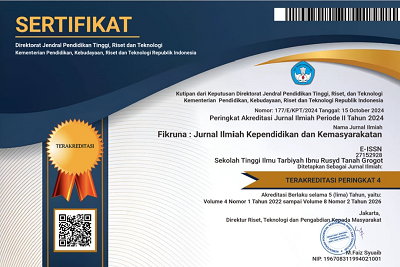INSTITUSIONALISASI NILAI-NILAI SUFISTIK DI PONDOK PESANTREN BANJARBARU
Abstract
Research on pesantren (Islamic boarding schools) demonstrates the advantages of pesantren as a subculture that represents Sufi values. Among the Sufi values in pesantren are repentance (taubat), piety (wara'), asceticism (zuhud), poverty (faqr), patience (sabar), trust in God (tawakkal), love (mahabbah), knowledge (makrifah), and contentment (ridha). These values are socially constructed through various institutionalized practices. Therefore, the author aims to explore how these Sufi values are institutionalized in the pesantren of Banjarbaru. The author employs a social constructionist approach as the research method, with a descriptive qualitative research design. Data are collected through interviews, observations, and documentation, with data reduction, data display, and data verification techniques for data analysis.
The findings of the study are as follows: 1) The institutionalization of Sufi values includes internalization, externalization, and objectivation simultaneously. In the internalization process, there is typification, habitualization, socialization, and indoctrination in the pesantren regarding Sufi values, both as values and as practices of the Sufi path (tarekat), through the pesantren curriculum based on the books Ihya Ulum al-Din, Siraj al-Thalibin, and Kifayah al-Atqiya, as well as through spiritual practices such as mujahadah, collective dhikr, fasting, bai'at (pledge of allegiance), and khalwat (spiritual retreat). In the externalization process, the Sufi values are expressed as ideologies and positive traditions with various adaptations. Objectivation shows the authority of the mursyid (spiritual guide), consistency in the implementation of sharia, rules, and suluk (spiritual conduct). 2) The Sufi values institutionalized in the pesantren include repentance (taubat) as abandoning sins and mistakes; piety (wara') as discipline and selectivity; asceticism (zuhud) as humility and simplicity; poverty (faqr) as independence and responsibility; patience (sabar) as perseverance and personal integrity; trust in God (tawakkal), love (mahabbah), knowledge (makrifah), and contentment (ridha) as obedience and gratitude. 3) The institutionalization of Sufi values in the pesantren contributes significantly to the strengthening of character and moral development.
References
A Steenbrink, Karel, Pesantren, Madrasah, Sekolah. Cet 1. Jakarta, Dharma Aksara Perkasa, 1986.
Asmaran As, Tarekat-Tarekat Di Kalimantan Selatan (�Alawiyyah, Samm�niyyah Dan Tij�niyyah), Al-Banjari, h. 177-198, Vol. 12, No. 2, Juli 2013, ISSN 1412-9507
Azra, Azyumardi, dan Idris Thaha. Pendidikan Islam: Tradisi Dan Modernisasi Di Tengah Tantangan Milenium III. Cet. 1. Jakarta: Kencana kerja sama dengan UIN Jakarta Press, 2012.
Azra, Azyumardi, Jaringan Intelektual Ulama Timur dan Kepulauan Nusantara Abad XVII, Bandung, Mizan, 1995
Berger, L. Peter and Luckmann, Thomas, The Social Contruction of Reality, New York, Doubleday and Company, 1966.
_________, Tafsir Sosial Atas Realitas, terj. Hasan Basari Jakarta: LP3ES, 1990
Berger, L. Peter, The Casred Canopy: Elements of a Sosiological Theory of Religion, New York, Doubleday&Company, Inc, 1967
___________, Langit Suci: Agama Sebagai Realitas Sosial, terj. Hartono, Jakarta, LP3ES, 1991
Bogdan, Robert, dan Sari Knopp Biklen. Qualitative Research for Education: an Introduction to Theory and Methods. 3rd ed. Boston: Allyn and Bacon, 1998.
Bustomi, Abu Amar. �Konstruksi Nilai Sosial Pesantren (Kontribusi pesantren Dalam Membangun Moral Bangsa).� Tarbawy: Jurnal Studi Pendidikan Islam 02, no. 01 (2017): 9.
Creswell, John W, dan J. David Creswell. Research Design: Qualitative, Quantitative, and Mixed Methods Approaches, 2017.
D. Marple, Donald. �Institutionalization Of Values: A Reengineering Case Study.�
Dhofir, Zamakhsyari. Tradisi Pesantren. Cet 6. Jakarta: LP3ES, 1994.
al-Ghazali, Abu Hamid. Al-Munqidz Min ad-Dhalal. Cet 3. Beirut: Muassisah al- Kutub as-Tsaqafiyyah, t.t.
���, Ayyuha al-Walad. 3 ed. Beirut: Muassisah al-Kutub as-Tsaqafiyyah, t.t.
���, Ihya� �Ulum ad-Din. Jilid 4. Cairo: Al-Maktabah at-Taufiqiyyah, t.t.
���, Mukasyafah Al-Qulu?b Al-Muqarrab Ila Hadhrah �Allam Al-Guyub. Cairo:
Ibn Muhammad, Ahmad, Al-Mafakhir Al-�Aliyyah fii Al-Ma�atsir As-Syadziliyyah. Cairo: Dar Al-Husain al-Islamiyyah, 1999.
Ibnu �Ajibah, Abu al-�Abbas. Iqadz al-Himam fii Syarh al-Hikam. Cairo: Al-Maktabah at-Taufiqiyyah, t.t.
Johnson, Burke. Educational Research: Quantitative, Qualitative, and Mixed, Jurnal ANSIRUPAI 01, no. 02 (Juli 2017): 08�19.
al-Kalabadzi, Muhammad Ibnu Ishaq. Al-Ta�aarruf Li Madzhab Ahli Al-Tashawwuf.
Majid, Nurcholis, �Pesantren dan Tasawuf, dalam Pesantren dan Pembaharuan, ed. M. Dawam Raharjo, Jakarta: Lembaga Penelitian, Pendidikan dan Penerangan Ekonomi dan Sosial, 1988.
__________, Bilik-bilik Pesantren: Sebuah Potret Perjalanan. Jakarta: Paramadina?: Dian Rakyat, 2009.
Mayudin dkk. �Implementasi Nilai-nilai Pendidikan Islam dalam Pengamalan Tarekat Naqsyabandiah di Pantai Cermin.� Edu Religia 02, no. 04 (2018): 500�516.
Miles, Matthew B., A. M. Huberman, dan Johnny Salda�a. Qualitative Data Analysis: a Methods Sourcebook. Third edition. Thousand Oaks, Califorinia: SAGE Publications, Inc, 2014.
Moesa, Ali Maschan. Nasionalisme Kiai: Konstruksi Sosial Berbasis Agama. Cet. 1. Surabaya?: Yogyakarta: IAIN Sunan Ampel Press?; LKiS?: Distribusi, LKiS Pelangi Aksara, 2007.
Mujiburahman, Tasawuf di Masyarakat Banjar: Kesinambungan dan Perubahan Tradisi Keagamaan, Kanz Philosofia 3, no. 2, Desember 2013.
Nasir S, Muh, Perkembangan Tarekat Dalam Lintasan Sejarah Islam Di Indonesia, Jurnal Adabiyah 11, No. 1, 2011, h. 113-127
al-Qusyairi, Abu Qasim. Al-Risalah Al-Qusyairiyyah Fii �Ilm Al-Tashawwuf. Cairo, Daar al-Sya�b, T.t.
Rahardjo, M. Dawam, Pesantren dan Pembaharuan, Jakarta, Lembaga Penelitian, Pendidikan dan Penerangan Ekonomi dan Sosial, 1988
Riyadi, Abdul Kadir. Antropologi Tasawuf: Wacana Manusia Spiritual dan Pengetahuan. Cetakan pertama. Jakarta, LP3ES, 2014.
Rohimuddin, Abu Muhammad. Al-Tashawwuf Alladzi Nuriduh. Cairo, Maktabah Umm al-Qura�, 2009.
Rusydiah, Evi Fatimatur. �Konstruksi Sosial Pendidikan pesantren: Analisis Pemikiran Azyumardi Azra.� Jurnal Pendidikan Agama Islam (Journal of Islamic Education Studies) 05, no. 01 (2017): 22�43.
al-Suhrawardi, Syihab ad-Din. �Awarif al-Ma�arif, Cet 1. Cairo, Maktabah al-Iman, 2005.
Shihab, Alwi, Akar Tasawuf di Indonesia: Antara Tasawuf Sunni dan Tasawuf Falsafi, Depok, Pustaka Iiman , 2009
Shubhi, Ahmad Mahmud ,Al-Falsafah al-Akhlaqiyah fi al-Fikr al-Islami: al-�Aqliyyun wa al-Dzauqiyyun aw al-Nadzar wa al-�Amal, Cairo, Daar al-Ma�arif, T.t
Siradj, Said Aqiel. Tasawuf Sebagai Kritik Sosial: Mengedepankan Islam Sebagai Inspirasi, Bukan Aspirasi. Cet. 1. Ujungberung, Bandung: Diterbitkan atas kerja sama Mizan [dengan] Yayasan Khas, 2006.
al-Thusi, Abu Nashr. Al-Luma� Fi Tarikh at-Tashawwuf al-Islami. Cet 1. Beirut, Dar al-Kutub al-�Ilmiyyah, 2001.
Van Bruinessen, Martin. Kitab Kuning, Pesantren dan Tarekat, Yogyakarta, Gading Pusblishing, 2012),
Wahid, Abdurrahman, �Pesantren Sebagai Subkultur�, dalam Pesantren dan Pembaharuan, , ed. M. Dawam Raharjo Jakarta, Lembaga Penelitian, Pendidikan dan Penerangan Ekonomi dan Sosial, 1988
Xena, Atika. �Internalisasi Pendidikan Karakter Di Pondok Pesantren.� Dewantara 7 (Juni 2019): 90�104.
Ziemek, Manfred. Pesantren Dalam Perubahan Sosial. Jakarta, P3M, t.t.
Copyright (c) 2024 Ihda Ihromi

This work is licensed under a Creative Commons Attribution-NonCommercial 4.0 International License.



.png)












